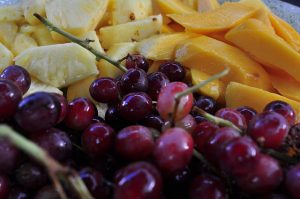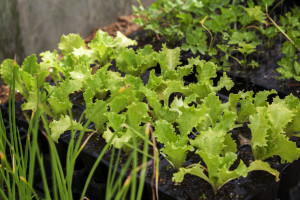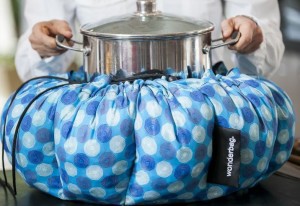Food, glorious food
- Published:
By Louisa Feiter
 Photo: Pedrik (Flickr)
Photo: Pedrik (Flickr)
Lazy summer afternoon braai’s, succulent roast with vegetables, spicy rice dishes or curries, freshly made chapattis, naan and roti’s, fish fresh from the harbour, summer salads and juicy summer fruit; these are tastes that we all anticipate eagerly and look forward to sharing with family and friends this December.
But as our taste buds tingle in anticipation it is also a good time to think about whether these tasty dishes will truly nourish us, body and soul. We invite you to think about where your ingredients are coming from and give some thought as to whether they are environmentally sustainable or not.
Where our food is coming from and what is in it is becoming increasingly important. We wrote about Green Monday South Africa in our last newsletter, an exciting initiative that is challenging us as consumers to think about the food we put in our mouths and into our bodies for at least one day a week.
Now we challenge you to think about it for the whole coming festive season and celebrate the holidays, Christmas or New Year’s with food that is not only delicious but is also kind to the environment. The Green Monday website has many wonderful recipes you can use to inspire your menus this December.
‘Local is lekker’
As the slogan goes in South Africa, sourcing locally is one great way of ensuring that what you are giving your family will be good both for you and the environment. Supporting small-scale farmers – and perhaps even getting to know them – will make your dishes taste even better this summer as you know where your food is coming from and what the quality of it is.
Grow your food
 Taking the time to grow some vegetables or herbs yourself is the surest way to know exactly what impact is being made on the environment and what quality of food you are eating. And it can be lots of fun and immensely satisfying to watch your plants grow and give fruit! For quick results buy grown herb plants from your local nursery like basil, parsley, chives, coriander or rosemary. These will keep replenishing themselves over the summer. Growing your own bean sprouts will also produce quick results and these pack a punch when it comes to good nutrients and are great in all summer salads. If you are up for a longer venture, vegetables like lettuce, tomatoes, carrots, radishes or green beans are relatively easy and rewarding to grow. Planting a fruit tree to mark the New Year, whilst not yielding results for a while, can be a New Year’s resolution with a difference.
Taking the time to grow some vegetables or herbs yourself is the surest way to know exactly what impact is being made on the environment and what quality of food you are eating. And it can be lots of fun and immensely satisfying to watch your plants grow and give fruit! For quick results buy grown herb plants from your local nursery like basil, parsley, chives, coriander or rosemary. These will keep replenishing themselves over the summer. Growing your own bean sprouts will also produce quick results and these pack a punch when it comes to good nutrients and are great in all summer salads. If you are up for a longer venture, vegetables like lettuce, tomatoes, carrots, radishes or green beans are relatively easy and rewarding to grow. Planting a fruit tree to mark the New Year, whilst not yielding results for a while, can be a New Year’s resolution with a difference.
Do some research
A lot of terms are being bandied around these days, like free-range or ethically produced, which are meant to placate consumers. However these can be misleading and we need to make sure we know what these words really mean. The website EATegrity is a good place to stop by to gain some clarity on this issue and many others. Sonia Mountford, who runs the website, is vastly knowledgeable about the food system in South Africa and advocates for short and transparent food chains. She also volunteers for SAFCEI’s One Web of Life (OWL) programme and is passionate about animal rights. So begin asking questions and finding out where your food is coming from and what methods have been used to produce it. You can also email Sonia to ask her advice on which farmers and initiatives to support within South Africa.
Avoid certain products
In a previous newsletter story we wrote about the harms of palm oil. Whilst it is a pervasive ingredient we encourage you to avoid products that contain it as much as possible. Supporting brands that do not use palm oil will also help urge producers to move away from using it or begin investing in palm oil which is sustainable.
Prepare food yourself
Making food can be an enjoyable experience and we are all beginning to roll up our sleeves in readiness for preparing the various feasts of the season. But how about expanding your culinary range and try making things that you would otherwise buy? Juices, syrups, jams, pickles, atjars or bread can all be fun holiday projects to involve your family in. In this way you shorten your food chain considerably and can hand-pick the ingredients yourself.
 Photo: Wonderbag World website
Photo: Wonderbag World website
Cooking methods
How we cook our food is also important as we plan our long menus of festive food. Hot bags are wonderful tools and there is no fear of anything burning while you run other errands or begin with the preparation of the next dish. SAFCEI has some great offers on these wonderbags, as they are also known, and are selling them for R280 each. They’re easy to use and their portability means you can take them along on a picnic as a cooler bag as well! Contact sarah@safcei.org.za for further information.
So we hope that when you give thanks for the food on your table this season, saying grace will take on a new significance and meaning as you ask for blessing of that which nourishes us day after day.
Who we are

SAFCEI (Southern African Faith Communities’ Environment Institute) is a multi-faith organisation committed to supporting faith leaders and their communities in Southern Africa to increase awareness, understanding and action on eco-justice, sustainable living and climate change.
Featured Articles
-

South Africa: Who Ends Up Paying If DMRE Cooks the Price of Nuclear Power?
-

South Africa’s nuclear energy expansion plans continue to draw criticism, environmental NGOs chew over legal challenge
-

Earthlife Africa and SAFCEI respond to latest unsettling nuclear news regarding the ministerial determination
-

Open Wing Alliance Africa (Virtual) Summit 2023
-

The Green Connection and SAFCEI respond to energy minister's divisive and deflecting comments
-

Job Vacancy: FLEAT Coordinator







